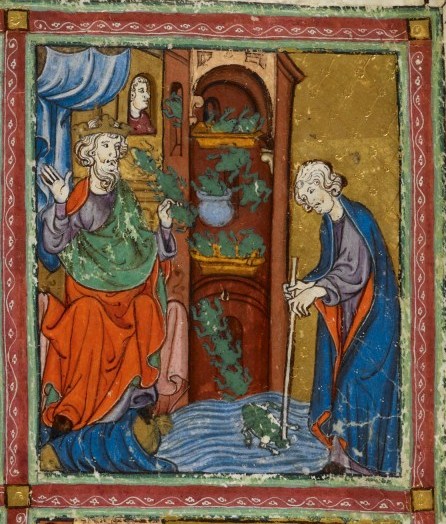צְפַרְדֵּעַ
| Part of Speech | Noun |
|---|---|
| Occurrences | 3 |
| Possible Meanings |
|
| Related Words | |
 | |
| Image | Click for צפרדע in Art |
Biblical Occurrences
The word "צְפַרְדֵּעַ" appears in only three places in Tanakh: Shemot 7:26 – 8:11, Tehillim 78:45, and Tehillim 105:30. As all three chapters speak of the same plague that was visited upon the Egyptians, the word is a virtual hapax legomenon making it difficult to determine its meaning.
Possible Meanings
Commentators provide two different identifications of the צְפַרְדֵּעַ,1 each one casting the Plague and its purpose in a very different light:
1. Frogs
Sources: Philo, Shemot Rabbah, R. Yonah ibn Janach, Lekach Tov, Ibn Ezra, Ma'asei Hashem, most other commentators
- Meaning and derivation – The etymology of the word "צְפַרְדֵּעַ" is unknown. Some suggest that it may be an onomatopoeic expression of the frog's croak.2
- Purpose of the Plagues – Philo asserts that Hashem preferred "to admonish the Egyptians [rather] than to destroy them," and thus initially sent smaller nuisances3 rather than larger and more destructive plagues.4 See Purpose of the Plagues.5
- Nature of the miracle – Philo emphasizes how Hashem has "need of no assistant," and thus purposefully did not deploy mighty bears, lions, or snakes to do his bidding, but rather chose small, insignificant creatures as His instruments.6
- "וּבְתַנּוּרֶיךָ וּבְמִשְׁאֲרוֹתֶיךָ" – R"Y Ibn Janach and R"E Ashkenazi note that the "צְפַרְדֵּעַ" was small enough to enter houses, and even ovens and dough (Shemot 7:28), and thus could not be much larger than a frog.7
- Effects of the Plague – Shadal explains that the language of devouring ("וַתַּשְׁחִיתֵם") found in Tehillim 78:45 regarding the "צְפַרְדֵּעַ" is simply a figure of speech.8
- "וַיִּצְעַק מֹשֶׁה" – This is the only time that this verb appears during the course of the Plagues. B. Lerner9 suggests that Moshe instinctively shouted in order to hear himself over the croaking of the frogs.
- Removal of the Plague – The Tanchuma and Shemot Rabbah note a distinction between the "צְפַרְדֵּעַ" which died in Egypt and the "עָרֹב" which simply left the country. They explain that Hashem removed the "עָרֹב" so that the Egyptians would not derive benefit from their hides, but left the carcasses of the frogs in Egypt because they were worthless.10
2. Crocodiles
- Meaning and derivation – Unknown.11
- Relationship to "תַּנִּין" – Commentators who identify "צְפַרְדֵּעַ" as a crocodile would likely identify the "תַּנִּין" as a serpent rather than a crocodile. See תנין – Serpent or Sea Monster.
- Effects of the Plague – The verbs "נֹגֵף" (Shemot 7:26) and "וַתַּשְׁחִיתֵם" (Tehillim 78:45) which are applied to the "צְפַרְדְּעִים" are understood to mean that there were fatalities.12
- Purpose of the Plagues – According to this approach, the Plague of "צְפַרְדֵּעַ" was designed to inflict severe harm. See Purpose of the Plagues.13
- Nature of the miracle – According to Abarbanel, the natural result of the fish in the Nile dying during the Plague of Blood, was that the crocodiles invaded the land of Egypt to find alternative sources of food. See The Plagues – Natural or Supernatural for further discussion of Abarbanel's general position on the Plagues.
- Origin of the Plague – Abarbanel attempts to prove from the repeated emphasis on "רַק בַּיְאֹר תִּשָּׁאַרְנָה" that the "צְפַרְדֵּעַ" was not previously native to the Nile, and thus the Torah states that hereafter they remained as living testimony to the miracle.14 The Ma'asei Hashem, though, dismisses Abarbanel's proof.15
- "וּבְתַנּוּרֶיךָ וּבְמִשְׁאֲרוֹתֶיךָ" – Abarbanel suggests that the crocodiles invaded the houses and ovens in search of food.16
- "רַק בַּיְאֹר תִּשָּׁאַרְנָה" – Abarbanel attempts to prove from here that the "צְפַרְדֵּעַ" could not be frogs, as frogs remained not only in the Nile, but also in other bodies of water.17